What Is The Former Bolashaq Head Known for?
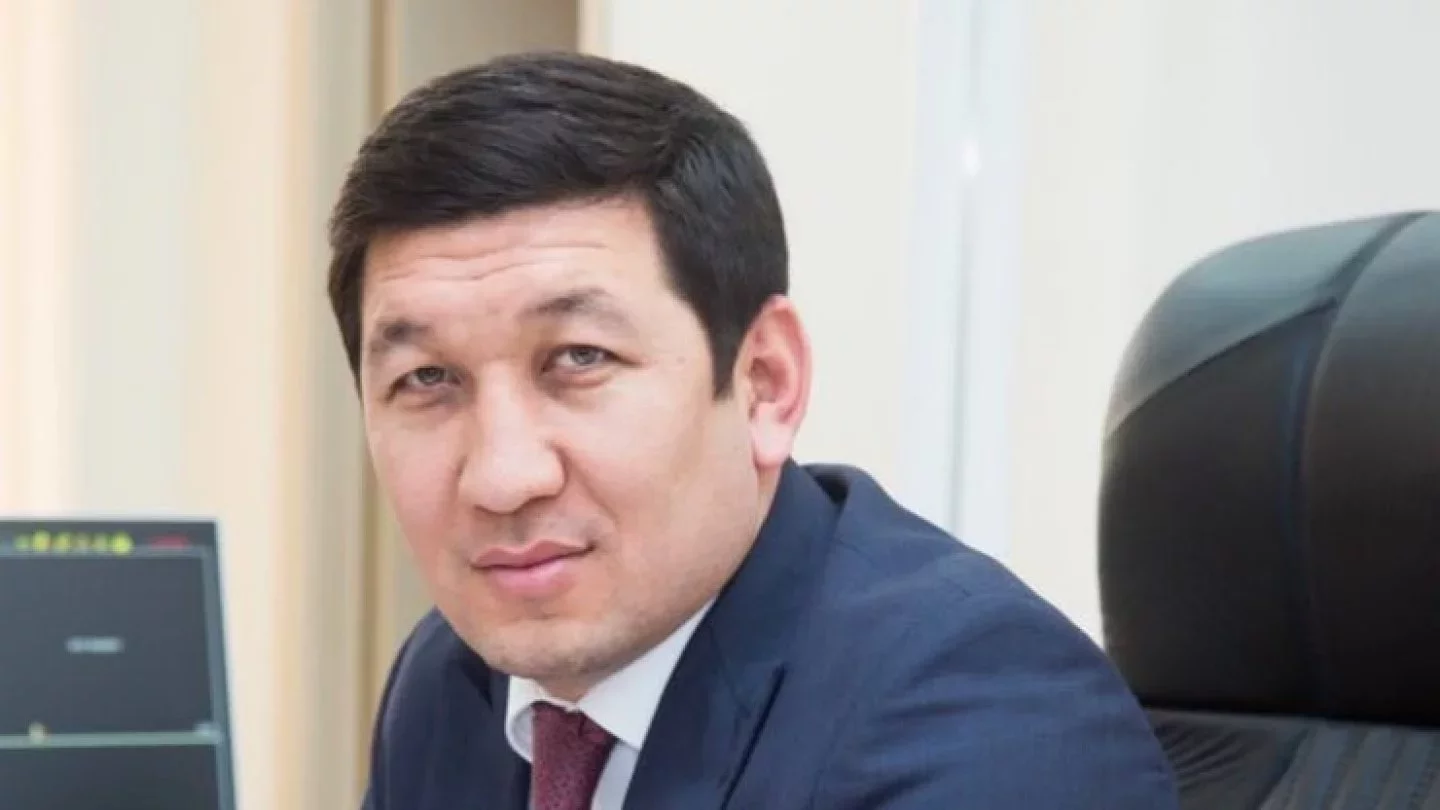 Coverphoto: Mheidegger / Wikimedia Commons, CC BY-SA 4.0
Coverphoto: Mheidegger / Wikimedia Commons, CC BY-SA 4.0
The situation surrounding the "Bolashaq" guarantors is anything but over. Orda.kz already wrote that it all started in 2019. At that time, Zhanbolat Meldeshov was its head. Meldeshov's reputation is cause for curiosity. Our correspondent managed to speak with Meldeshov.
A Sticky Situation
Natalia Vorobyova and Makpal Daribayeva, the guarantors of Valeria Gavrilenko, a former Bolashaq scholarship holder, have reached out to the president and the public. They claim that even though Gavrilenko did not fulfill her obligations under the contract with Bolashaq, her property was illegally removed as collateral in 2019. The Center has presented them with a debt of almost 30 million tenge.
The Center's management released a subsequent statement for the media. The press release states that Bolashaq had initiated an internal investigation revealing violations in the procedure for removing program participants' collateral. The center has named Zh. Meldeshov, his deputy, M. Alpysbay, and the head of the legal department, A. Sharambayev, as the main persons in question. The Prosecutor's office, the KNB, and the Interior Ministry are in the loop about the investigation results.
After these facts were revealed, the Center repeatedly sent statements to the relevant authorities regarding former employees on the facts of official forgery to take measures and bring the perpetrators to the liability provided for by law, the Bolashaq press service said.
Meanwhile, The Ministry of Science and Higher Education sent a letter to the Prosecutor General’s Office requesting former employees of the Bolashaq Center be held accountable. The ministry has also contacted the migration service to have Gavrilenko returned to Kazakhstan.
An Orda correspondent was able to reach Meldeshov. He declined to comment on the scandal, stating that he did not remember the details of the case.
This is the sixth year I have not worked in this organization. I don't remember anything about this situation, and I'm afraid to make a mistake when commenting; I don't know many nuances. Today, I called the lawyers who had dealt with this issue at the Center for International Programs. They said there was a proceeding in this case. But I do not know the details of this proceeding. Because the proceeding was in 2020, and I left the center in 2019. The lawyers told me that these guarantors were involved in this trial. They know a lot more than I do, Meldeshov said.
But as Natalia Vorobyova explained to us, the trial was in 2021, and V. Gavrilenko was the defendant, not the guarantors:
The trial against Gavrilenko took place in 2021. We didn't participate there; we were like third parties. Then, there was an appeal against this court in 2022. The trial took place directly with our participation in 2024. We were involved as guarantors. We have nothing to do with the other cases that Meldeshov mentions.
The Court of Appeal's decision in 2022 stipulates that Gavrilenko pay damages to Bolashaq. She began to pay the debt, but only in March 2023, and partially — 100,000 tenge per month (roughly $223). At this rate, Gavrilenko, who has been living in the UK since 2019, would have paid off the debt only after 22 years. Therefore, the Center decided to initiate legal proceedings against the guarantors.
The Center has gone to court with Meldeshov more than once. But for a completely different reason.
Sheep or Prestigious Scholarship Holders?
Meldeshov headed Bolashaq from 2016 to 2019. During this time, he managed to make the news. A year after his appointment, the dismissed employees of the Center reached out to the Ministry of Education, the Prosecutor General's Office, and the Presidential Administration. They stated that their former boss fired employees to hire his own people, treated subordinates rudely, and called Bolashaq participants sheep.
Universities accept a sheep as long as it is paid for... Then, this sheep is kicked out. Then this sheep comes to us, and he has 48 million tenge to pay... Because of this, the program suffers, and the leadership of the republic is stressed, Meldeshov said
The Ministry of Education conducted an internal investigation and temporarily suspended Meldeshov. He still managed to keep his post but received a severe reprimand.
The "Meldeshov" Bonus
In 2019, the Ministry of Education conducted an internal state audit of the Center. They looked into Bolashaq's activities from January 1, 2017, to June 30, 2019. According to their report, some center employees received unfounded bonuses totaling 6,251,500 tenge over two years.
In 2020, the center's new management filed a lawsuit against Meldeshov, his former deputy, T. Askarov, and the Financing and Monitoring Department manager, A. Sarmanov. The Center for International Programs insisted the defendants pay damages in the amount of the bonuses paid. However, the court did not recognize the bonuses as "direct actual damage" and rejected Bolashaq's claims.
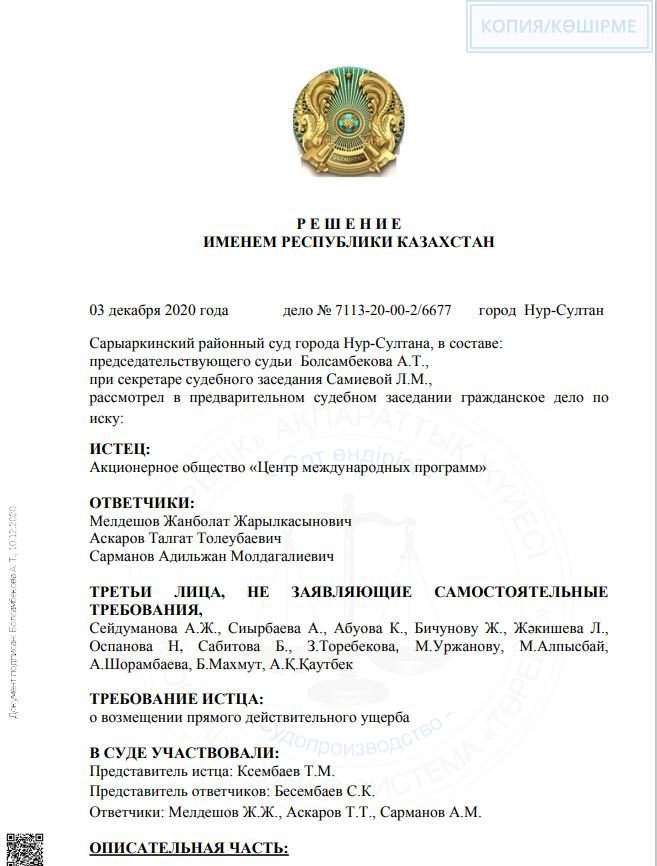
Bolashaq?
Before leaving Bolashaq, Meldeshov registered a company, the non—profit organization Bolashaq Development Fund Non-Profit Organization, in July 2019. The non-profit foundation organized educational exhibitions and fairs for Kazakhstanis seeking to study abroad.
Bolashaq Development Fund Non-Profit Organization used the official logos of the Bolashaq Center for International Educational Programs.
The Fund did this until September 2021. The Economic Court of Astana (then Nur Sultan) banned Meldeshov's Foundation from using the Bolashaq logo. The Center for International Programs initiated the process. The defendant later filed an appeal, which was rejected.
Univero CC has replaced the Bolashaq Development Fund Non-Profit Organization on its old social network profiles. The company provides paid consultations to possible students and their parents on finding a foreign university and how to enroll. A profile header suggests the company is not a non-profit and calls it a "market leader."
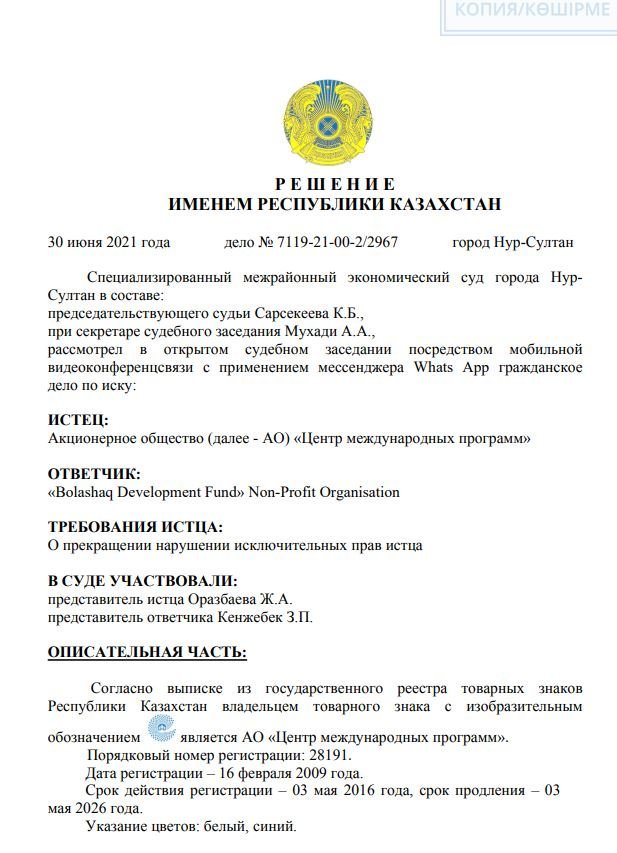
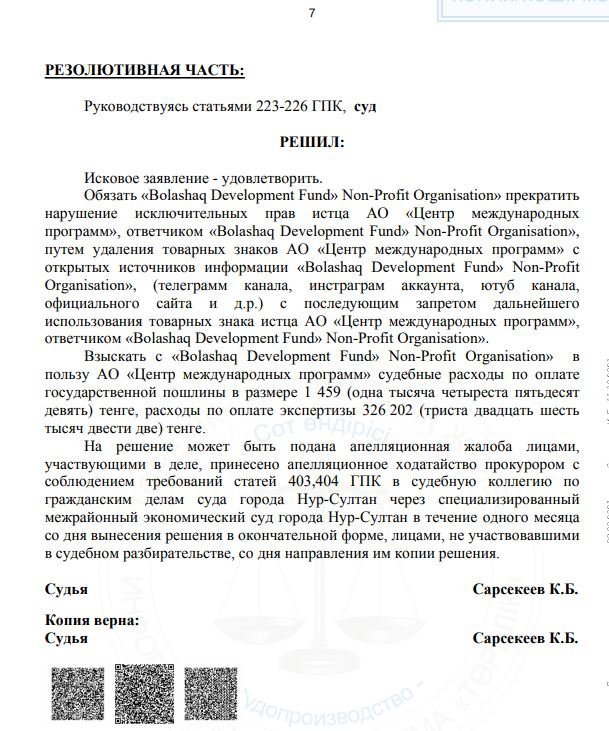
Incidentally, another company with a similar name is listed under Meldeshov. "CHK Univero LTD" was registered in April 2021 as a legal entity engaged in software development (the head and founder is J. A. Meldeshov).
We tried to open the official Univero CC website:
Unfortunately, this feature was blocked because the page owner did not pay for it on time. If it is not difficult, inform the page owner about this problem,a notification says
Many questions remain for Mr. Meldeshov. Most importantly, how many Bolashaq fellows has he allowed, just like Gavrilenko, to illegally withdraw from all obligations to the state and go abroad? How and when will the budget billions spent on training specialists working in other countries be returned? Meldeshov himself told our correspondent that during his work as the center's head: "collateral of 500 to 1,000 people was removed per year."
Meldeshov Gives Further Comments
Meldeshov later commented on the situation with the Bolashaq program graduate. He has explained why Gavrilenko did not work the five-year state service required by contract. The state paid for her studies and life abroad. Meldeshov also clarified why her collateral was released.
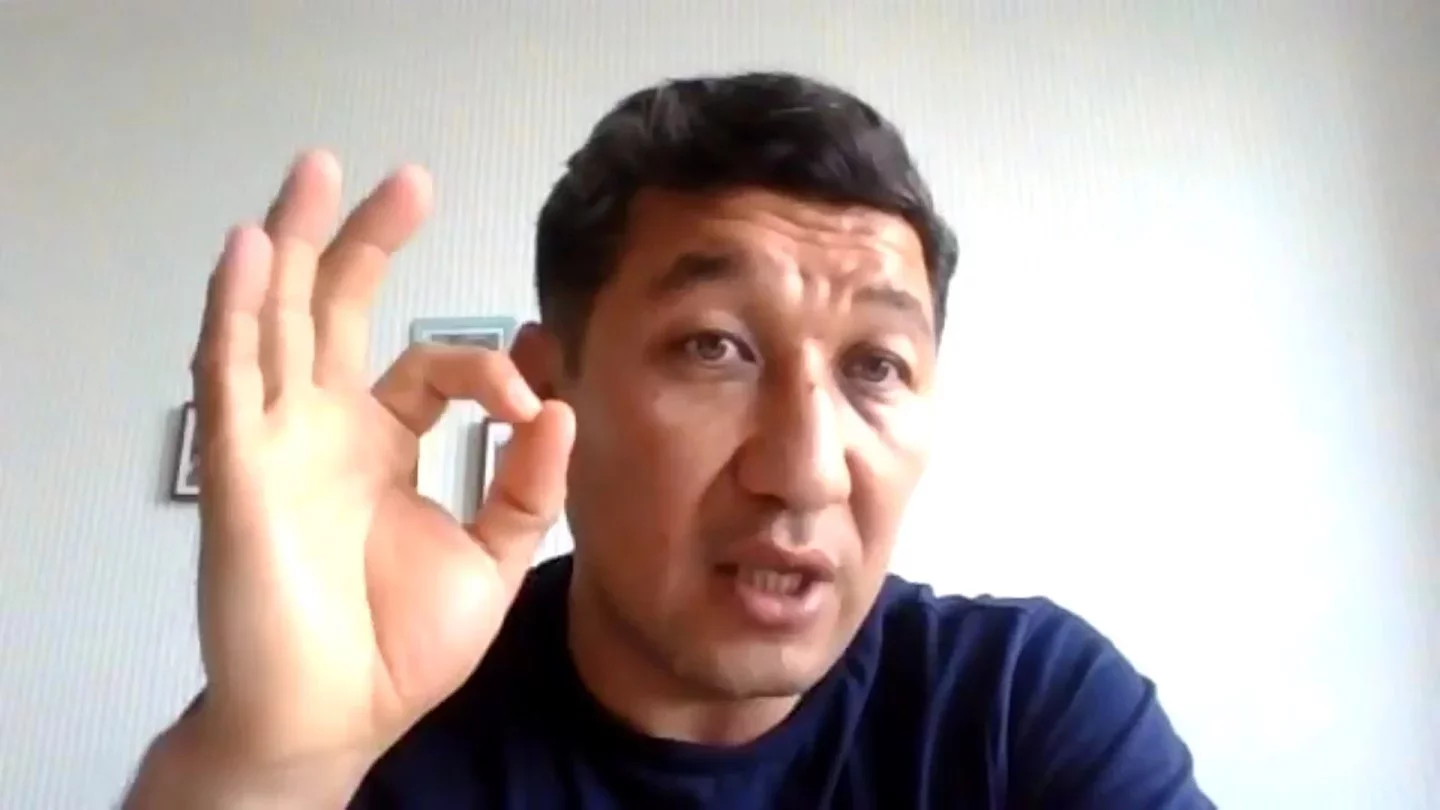
“Firstly, I would not call this a scandal since a scandal implies illegal actions. The situation with Gavrilenko, unfortunately, is standard for Bolashaq. I have said repeatedly that taking people's collateral and calling it a scholarship and then treating them like prisoners and prosecuting them is wrong and ineffective." said the ex-president of the center.
He also explained in detail his actions regarding Gavrilenko:
As for Gavrilenko, yes, I signed a document that released her collateral. But it seems to me that her actions were somewhat foolish. If she had turned to me for advice, I would have signed this document anyway. There was no need to slip it to me since I often signed such papers.
Meldeshov claims that this was common for him. The scholarship holder studies abroad and returns; their property has been pledged to the Center for decades.
Sometimes, people came and said that they needed to sell or exchange a property, to release it due to life circumstances. And I would meet them halfway because there were guarantors, there was other collateral, he noted.
Gulnara Bazhkenova noted that Gavrilenko’s case differs from those mentioned: “Let’s not say that Gavrilenko worked for decades and there was collateral. She only worked for the state for a year.”
OK OK. I want to say that this is not an out-of-the-ordinary situation. Yes, I signed. But this does not harm either the state or the CIP (ЦМП - Center of International Programs - Ed.) I have questions for the guarantors who, after five years, suddenly discovered that they are guarantors. They brought Gavrilenko, gave guarantees for her, signed for it, and five years later they are upset. They want to collect money, and this is logical if contractual obligations are not fulfilled, Meldeshov explained.
He added that he signed because it was his responsibility. They brought him a document with departmental stamps.
120 people worked at the center, each with their own responsibilities. I was signing up to a thousand scholarships a month and couldn't check every document. If the document was approved by the financial or legal department, I signed it. The media talks about a corruption scandal. If this were a corruption scandal, someone would have to take a bribe. Who gave me the money? Who saw it? We need to talk about this carefully, he says.
When asked about checking compliance with the rules of the Bolashaq program, Meldeshov replied that there is a corresponding department and verification measures. He couldn't question every document. And if he were to be in the same situation, he would sign this document again, as he regrets nothing.
If I had known about the situation beforehand, I would have called Gavrilenko and talked to her. I would have convinced her to write a statement about exclusion from the program, I would have signed off on a lenient payment schedule for her. But she did herself a disservice by making a criminal of herself. She ends up paying off the debt. I recently called lawyers who said that there is a court decision and a payment schedule,the speaker summarized.
Corruption at the Center for International Programs
Meldeshov also claims corruption at the Center for International Programs. He says he was shocked by such schemes when he started. In the first months, he claims to have discovered the embezzlement of three million dollars transferred to people's accounts. Supposedly, they had nothing to do with the scholarship recipients or employees of the Center.
I handed over all the materials to law enforcement agencies, including documents signed by former management. For nine years this embezzlement occurred, management signed documents, but nothing happened, Meldeshov said.
The deputy chief accountant would later be convicted. The accountant admitted to committing the crime and received three years in prison. However, according to Meldeshov, it was obvious that nine people were involved. Five of them received money on their cards for nine years. They later said they gave the card info to the deputy chief accountant “by accident.”
There was also a money laundering scheme associated with scientific internships.
It was reminiscent of the series The Octopus. A whole scheme was created in which people from various departments were involved. I had to shut this scheme down. I reported to the minister, and he said to stop it immediately, call a press conference, and announce it. However, I was afraid to cause unnecessary commotion and limited myself to shutting down the scheme,
he said.
Scientific internships provided the opportunity to participate in a scientific and practical internship abroad. But people, often with minimal knowledge of English, applied and received scholarships. They received coverage for accommodation, food, flights, and other expenses. They spent time abroad, ostensibly doing an internship, and returned with fictitious course completion documents.
Not only those who “interned” benefited but also those who sent them to these internships. Some were sent to fictitious entities created abroad, where hundreds of thousands of dollars were funneled. Those who benefited were the people in Kazakhstan - the organizers.
When I figured out the situation, smart people came to me and said that this was a huge system. The minister told me to look into it and report to law enforcement agencies. I answered him: 'I’m not Commissario Cattani. They could kill me near an entrance for this. Tens of millions of dollars and serious people are involved here.' Some names did appear in this project, but I did not want to go deeper into the investigation, as it could have been dangerous, Meldeshov said.
A year before Minister Sagadeyev's dismissal, Meldeshov wrote a resignation letter, but the minister rejected it. After a new head of the department was appointed, Meldeshov tried to resign again.
This time, I even warned the ministry's leadership: 'Listen, guys, if you don’t sign the statement, it will be worse for you because I will inconvenience you.' As a result, my application was accepted, and I left my position. No corruption scheme will fly with me. I sent three letters to officials of whichever rank, he said.
Meldeshov also claims there was an incident when the deputy head of the presidential administration called him into his office and said that he would “be kaput.”
Because I refused to illegally send one married couple under the Bolashaq program. I said it was against the rules. He said that I was “kaput”. It was Mailybayev. The former head of the presidential administration also threatened me, saying: “I will roll you into the asphalt.” So that you understand what level of surnames I had to work with and who I had to refuse, he added.
The interview will be available on Orda's YouTube channel on Saturday. It will be in Russian.
Original Authors: Article 1 - Aliya Askarova, Article 2 - Artyom Volkov
DISCLAIMER: This is a translated piece combining two separate articles. The texts have been modified, but the content is the same. Please refer to the original articles in Russian—Article 1 and Article 2. Article 1's content has been updated to reflect the current situation as of 31/05/24.
Latest news
- Modernization of Syrym Checkpoint Promises Smoother Border Crossings, Orda.kz Talked with Drivers about Current Situation
- High Inflation Prompts Government to Temporarily "Freeze" Utility Rate Hikes
- Foreign Minister Nurtleu Represents Kazakhstan at BRICS Summit
- Russia Approves Duty-Free Oil Supplies to Kazakhstan Through 2028
- Trump Sends Tariff Warning Letters to Global Leaders, Including Over Kazakh Imports
- Russia’s Transport Minister Roman Starovoit Dies by Suicide After Resignation
- Almaty Celebrates National Dombra Day
- Trump Threatens 10% Tariff on Countries Supporting BRICS Policies
- Why Did Kazakhstan’s President Not Attend the Azerbaijan Summit?
- Beijing Celebrates Dombra Day with Kazakh Music Performance
- Kozhamzharov’s Circle: What Are Investigators Hoping to Find?
- “I Want to Be Nazarbayev”: How Academician Yespolov’s Grandson Joined the Elbasy Clan
- Armenia Denies Russian Military Reinforcement at Gyumri
- Mayors Detained in Türkiye as Part of Fraud Investigation
- Olesya Keksel Reportedly Involved in Criminal Case Over BTA Bank Torture Allegations
- Mother of Conscript Claims Son Was Committed to Psychiatric Institution Without Consent
- President Toqayev Sends Nazarbayev Birthday Wishes
- Toqayev Appoints New Ambassadors in Series of Diplomatic Changes
- Unidentified Object Resembling Drone Found in Atyrau Region
- Trump and Zelenskyy Discuss Air Defense Needs

